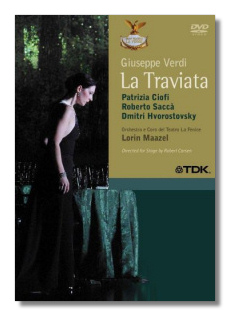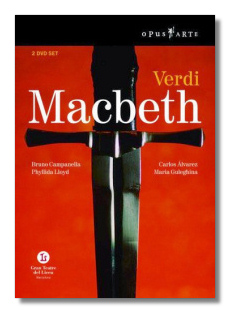
The Internet's Premier Classical Music Source
Related Links
- Verdi Reviews
- Latest Reviews
- More Reviews
-
By Composer
-
Collections
DVD & Blu-ray
Books
Concert Reviews
Articles/Interviews
Software
Audio
Search Amazon
Recommended Links
Site News
 DVD Review
DVD Review
Giuseppe Verdi

La Traviata
- Patricia Ciofi – Violetta
- Roberto Saccà – Alfredo
- Dmitri Hvorostovsky – Germont
- Eufemia Tufano – Flora
- Elisabetta Martorana – Annina
- Salvatore Cordella – Gastone
Orchestra & Chorus of Teatro La Fenice/Lorin Maazel
Recorded Live at Teatro La Fenice filmed November 18, 2004
TDK DVD DVWW-OPLTLF LPCM Stereo Dolby Digital DTS Anamorphic Widescreen


Macbeth
- Carlos Álvarez – Macbeth
- Maria Guleghina – Lady Macbeth
- Roberto Scandiuzzi – Banquo
- Begoña Alberdi – Lady-in-waiting
- Marco Berti – Macduff
- Javier Placios – Malcolm
- Ferran Ilari – Fleance
- Stefan Kocan – Physician
- Josep Ferrer – Manservant
- Francisco Santiago – Assassin
- Ivo Mischev – Herald
Symphony Orchestra & Chorus of the Gran Teatre del Liceu/Bruno Campanella
Recorded live at the Gran Teatre del Liceu, Barcelona – March 30 and April 2, 2004
Opus Arte DVD OA0922D 2DVDS LPCM Stereo Dolby Digital DTS Anamorphic Widescreen
The TDK DVD is an account of the original version of La Traviata. After its unsuccessful première in 1853 Verdi expanded the opera from three acts to four and made a number of other changes, most noticeably in these Second Act numbers: the famous Violetta-Germont duet, where the vocal writing for Germont is higher in the original; Germont's cabaletta; and the Violetta-Alfredo duet after the card scene, which, like everything in the Finale secondo, would be placed in the Third Act. In the Third Act there are some changes as well in the duet and Finale ultimo, and the whole would be relocated to the Fourth Act. Still, this is not a substantially different work from the revised version most opera-goers know well.
Verdi mavens will want it, of course, as well as fans of the lead singers in the cast, Patrizia Ciofi, Roberto Saccà and the splendid Dmitri Hvorostovsky, all of whom are in fine form here. In fact, the entire cast and chorus acquit themselves quite well.
But the production will be controversial for many potential buyers, owing to its modern treatment of the opera in its sets, costuming – including rather scantily dressed dancers at Flora's gambling party – and in most other details: Alfredo, for example, is a photographer who often busily snaps pictures. True, Verdi wanted a modern setting and costuming for La Traviata, but, owing to political considerations, had to settle for an historical one, the story being set back to about 1700. Still, I'm not sure that fact alone justifies moving the opera from Verdi's mid-19th century setting to the 21st century.
At any rate, the sets and stage direction here are fine, and Lorin Maazel's conducting and the orchestra's playing are first-rate. The sound reproduction from this live performance is quite detailed. All in all, this is a compelling, even provocative La Traviata that certainly won't bore you.
The Opus Arte DVD of Macbeth has garnered rave reviews from Europe and it is easy to see why: every cast member here is excellent, with Carlos Álvarez turning in one of his finest performances. Maria Guleghina gets stronger as she goes along: the dramatic intensity of her opening number Vien! T'affretta! is effective alright, but its unevenness hampers the musicality somewhat. Thereafter she is more convincing, and overall is as impressive as Álvarez. The duo's First Act Allor questa voce is full of intensity and drama, subtlety and musical beauty. Guleghina's Second Act Ai trapassati is powerfully compelling and Álvarez' Fourth Act Pieta, rispetto deftly exudes passion and regret.
Among the other cast members, Roberto Scandiuzzi's Banquo is brilliant, and Marco Berti as Macduff is equally splendid. As I said above, the cast is simply stunning, with not a weak or mediocre performer among them. Bruno Campanella leads the proceedings with insight and energy, fully capturing the dark character of Verdi's score.
But the stage direction, by Phyllida Lloyd, is also inspired and thoroughly atmospheric in its general barrenness of appearance. Ms. Lloyd has employed Anthony Ward's imaginative set designs and costuming, as well as the brilliant, if occasionally overly darkish lighting techniques of Paule Constable. Visually, this is a stunning production, one, I understand, that was premièred at Covent Garden sometime earlier. It is a bloody affair, to be sure, not only literally but often in the reddish costumes and scenery – all, however, to excellent effect.
The sound reproduction is excellent, fully state-of-the-art, rounding out one of the finest operatic offerings to be had on DVD. Highest recommendations!
Copyright © 2006, Robert Cummings




















